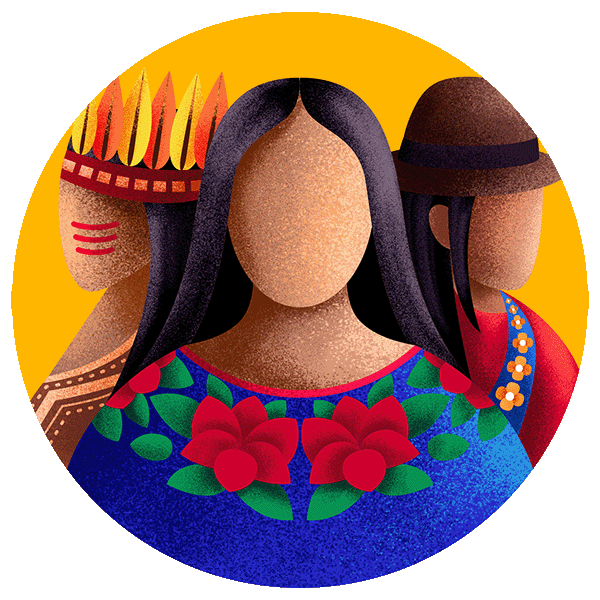
Celebrating The Hardships We Endured - Slavery at Paarl, Western Cape, South Africa
Slavery played a significant role in the early history of Paarl, Western Cape, particularly during the 17th and 18th centuries under Dutch and later British colonial rule. Enslaved people—brought mainly from East Africa, Madagascar, India, and Southeast Asia, as well as Indigenous Khoisan people—were forced to work on farms, vineyards, and in households, forming the backbone of the local agricultural economy. Their labour was central to the development of Paarl’s wine and wheat industries.
Join Us As We Welcome Our New Board Member, Dr. Lyla June Johnston
Cultural Survival welcomes the newest member of our Board of Directors, Dr. Lyla June Johnston. Lyla June is an Indigenous musician, author, and community organizer of Diné (Navajo), Tsétsêhéstâhese (Cheyenne), and European lineages. Her multi-genre presentation style has engaged audiences around the globe towards personal, collective, and ecological healing. She blends her academic work in Human Ecology and Indigenous Pedagogy with the traditional worldview she grew up with to inform her music, perspectives, and solutions.
Welcome Alicia Moncada - Our New Director of Advocacy and Communications
Cultural Survival welcomes Alicia Moncada (Wayuu), who has joined as our new Director of Advocacy and Communications. She brings over 13 years of experience in human rights advocacy, research, and communication, with a focus on Indigenous Peoples' rights, gender justice, and climate justice. Moncada was born in Venezuela, sought refuge in Mexico, and is now based in London, England. Her academic background includes degrees in Law and Women's Rights, with specialized training in International Human Rights Law and International Humanitarian Law.
Produced by Shaldon Ferris (Khoi/San)
Unearthing Injustice - Repatriating The Bones Of Our Ancestors
Ancestral remains of six Khoi and San individuals, exhumed between 1868 and 1924 and held at the Hunterian Museum in Glasgow, Scotland, have been returned to South Africa. The remains were formally repatriated in October 2025, marking a significant event for national healing and the restoration of dignity for the affected communities. The remains, which include those from the Northern and Western Cape, have been returned to the Iziko Museums in Cape Town and will be reburied in the Northern Cape at a later date.
Modern Day Slavery - Bonded Labor in Asia
Bonded labor, also known as debt bondage, remains a widespread form of modern slavery in parts of Asia, particularly in countries like India and Bangladesh. It typically occurs when individuals are forced to work to repay a debt under exploitative conditions, often with little or no wages and no clear end to their obligation. Entire families, including children, can be trapped in cycles of debt for generations, working in sectors like agriculture, textiles, and mining. Despite legal bans in many countries, weak enforcement and poverty continue to fuel this human rights violation.
More Than Just A Servant - Krotoa Reimagined
Krotoa, also known as Eva, was a young Khoi woman who played a significant and complex role in early South African history during the Dutch colonial period. Taken in as a servant in the household of Jan van Riebeeck, the first Dutch commander at the Cape, Krotoa served as a translator and cultural mediator between the Dutch settlers and her indigenous Khoi people. Fluent in both Dutch and Khoikhoi languages, she became a vital link in early negotiations and trade.
UNPFII 2025 - Uplift The Voices Of Indigenous Women
The Indigenous Media Zone will provide Indigenous media, journalists and platforms a working space equipped with WiFi during the 24th Session of the Permanent Forum. The space will also allow for interaction with non-Indigenous media. Cultural Survival attended UNPFII 2025 and interviewed some of the delegates that attended.
Produced by Shaldon Ferris (Khoi/San)
Interviewee: Chelsey Perry (Nisga'a)
Music 'Libres Y Vivas' by Mare Advertencia, used with permission.
'Burn your village to the ground' by The Haluci Nation, used with permission.
Justice For Indigenous Women!
Violence against Indigenous women is a pervasive and multifaceted issue that includes physical, sexual, emotional, and economic abuse, often rooted in the historical and ongoing impacts of colonization, racism, and systemic inequality. Indigenous women face disproportionately high rates of violence, including intimate partner violence, human trafficking, and murder, frequently exacerbated by the lack of access to justice and inadequate responses from law enforcement.
Break The Silence - Stop The Violence
To combat violence against women and girls, governments and international organizations must strengthen the protection systems for Indigenous girls, promote culturally sensitive education, and support initiatives that empower Indigenous communities to prevent violence and ensure justice for affected girls.
Alice Tipap from the Maasai Community spoke to us about violence against women amongst Indigenous Maasai people.
Produced by Shaldon Ferris (Khoi/San)
Interviewee: Alice Nina Tipap (Maasai)
Music: 'Whispers', by Ziibiwan, used with permission.
A Market For Vendors From Around The World
The Cultural Survival Bazaars are a series of cultural festivals, organized by Indigenous Peoples’ rights organization Cultural Survival, that provide Indigenous artists and artisans, cooperatives, and their representatives from around the world the chance to sell their work directly to the public.
Each event features traditional and contemporary crafts, artwork, clothing, jewelry, home goods, and accessories from dozens of countries.
